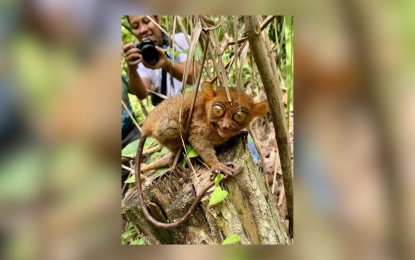
ENDEMIC. The tarsier caught by a farmer in Quinapondan, Eastern Samar in this Nov. 14, 2023 photo. Local authorities have warned residents that it is unlawful to possess a tarsier, a primate that is endemic to the Philippines and commonly found in the islands of Bohol, Samar and Leyte. (Photo courtesy of Uswag Quinapondan)
TACLOBAN CITY – Local authorities have warned residents that it is unlawful to catch and possess a tarsier after a farmer in Eastern Samar put a captured primate in a cage.
Felix John Bianes, Quinapondan, Eastern Samar municipal environment and natural resources officer, said Thursday the frequent sightings of tarsiers on the outskirts of their town calls for high awareness of environmental laws among locals.
The official issued the reminder a few days after Florencio Caandoy, caught a tarsier while collecting firewood in Palactad village, Quinapondan town on November 13.
“It’s good that the farmer informed us about the tarsier and told us that he has no intention of keeping the primate. However, he is not aware that it is illegal to catch a tarsier,” Caandoy said in a phone interview.
Witnessed by personnel from the Department of Environment and Natural Resources (DENR), the tarsier was released back into the wild.
It was not the first time that a tarsier was seen in the forest of Quinapondan, Caandoy said.
Earlier, a Philippine tarsier was also seen and photographed in Caucab village in Almeria town in Biliran province.
Last year, a sighting of a tarsier was documented in Tacloban during the night survey by the University of the Philippines Tacloban in Sta. Elena village.
Tarsier is a primate that is endemic to the Philippines and commonly found in the islands of Bohol, Samar, and Leyte, including Biliran and Maripipi islands.
A nocturnal, its main diet is insects like grasshoppers, crickets, spiders, small vertebrates such as small lizards and birds.
The mere possession of a wildlife animal, particularly those that have been declared as “endangered” is punishable under Republic Act No. 9147, otherwise known as the Wildlife Resources Conservation and Protection Act.
Section 27 of the law provides the penalties for illegal possession of wildlife, which include imprisonment of up to four years and fines of up to PHP300,000.
Wildlife species, according to DENR, are very sensitive and will not live long if they are taken out of their natural habitats. (PNA)
